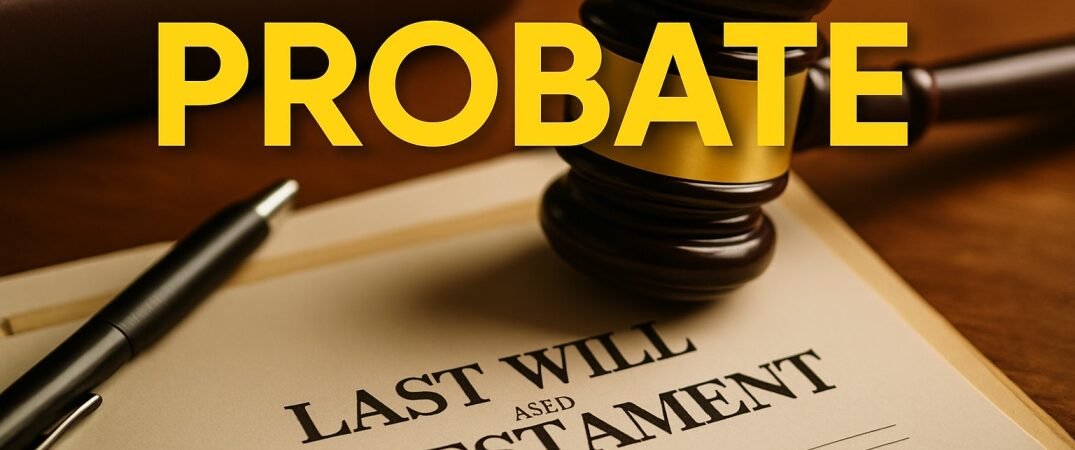When someone passes away, and they’ve left behind a will, the next important step is to validate that will legally.
This legal process is called Probate.
But what exactly is probate, when is it needed, and how does one go about getting it done in India?
Let’s break it down.
🧾 What Is Probate of a Will?
Probate is the legal process through which a will is certified by a competent court as genuine and valid.
It confirms that the will was made by the deceased voluntarily and without coercion, and that the executor named in the will can proceed to administer the estate.
Once probate is granted, it becomes a conclusive legal proof that the will is valid and binding.
📜 Why Is Probate Required?
Probate is important for two reasons:
- It legally confirms that the will is not forged, and that it was executed according to law.
- It gives the executor official authority to deal with the deceased’s property.
In India, probate is mandatory if the will relates to properties situated in the cities of Chennai, Mumbai, and Kolkata, as per Section 213 of the Indian Succession Act, 1925.
In other cities or rural areas, probate is optional unless specifically required by parties or banks involved in the property transaction.
🏛️ Who Grants the Probate?
Probate is granted by the District Court or the High Court having jurisdiction over the area where the deceased resided or had immovable property.
The person applying for probate must be either:
- The executor named in the will, or
- A legal heir if no executor was named.
📑 Documents Required for Probate
To obtain probate of a will, the applicant must submit:
- The original will
- The death certificate of the testator
- An affidavit from the executor
- Details of legal heirs and beneficiaries
- Court fees and stamp duty as applicable
- Proof of identity and address of the applicant
- No objection certificates (NOCs), if required
🕰️ Timeframe for Probate
If there are no objections, the probate process can be completed in 6 to 12 months.
However, if there are disputes or objections by legal heirs or third parties, it may take longer and involve full-fledged court proceedings.
⚖️ Case Law Example
In K.K. Balu vs. State of Tamil Nadu (2004), the Madras High Court ruled that probate is mandatory in Chennai for a will to be acted upon.
Similarly, in Krishna Kumar Birla vs. Rajendra Singh Lodha (2008), the Supreme Court held that any beneficiary can apply for probate, even if they’re not the named executor.
These rulings underline the legal requirement and importance of probate in cities where it is mandated.
📊 Stamp Duty and Probate Fees in Karnataka
In Karnataka, stamp duty for probate of a will is currently ₹200, as per Article 11 of the Karnataka Stamp Act.
Court fees and lawyer’s charges may vary depending on complexity, estate value, and whether the matter is contested.
🔍 What Happens If You Don’t Probate?
If a will is not probated where it is mandatory, the following consequences may arise:
- The will cannot be relied upon legally
- Banks and registrars may reject transactions
- Legal heirs may not be able to transfer property titles
- It may lead to disputes or litigation among family members
💡 Is Probate Needed for Every Will?
No. In many parts of India, probate is not mandatory unless:
- The property is located in Chennai, Mumbai, or Kolkata
- It’s required by a registrar, bank, or buyer
- The authenticity of the will is challenged
Still, many advocates recommend probate even in optional cases, as it gives stronger legal standing and prevents future disputes.
📌 Conclusion: Legal Clarity Starts with a Valid Probate
If you have lost a loved one and are holding their will, don’t delay getting it validated.
Probate is not just a legal formality—it’s your first step toward securing your rightful inheritance and safeguarding the testator’s wishes.
Whether you are an executor or a beneficiary, we can guide you through the probate process smoothly.
📧 Email: ranjinijayaram@rjpropertylaw.com
📱 Phone: 8088417193
🌐 Website: www.rjpropertylaw.com
Let RJ Property Law assist you with probate applications, succession certificates, and will drafting in a professional and hassle-free way.
❓ FAQ: Probate of a Will in India
1. Is probate mandatory for every will in India?
No, it’s mandatory only for wills involving properties in Chennai, Mumbai, and Kolkata. Elsewhere, it is optional unless required by specific parties.
2. Can I sell property without probating the will?
Only if probate is not legally required. In cities where it is mandatory, you cannot sell or transfer the property without it.
3. Who can apply for probate?
The executor named in the will or a legal heir if no executor is named.
4. What if the will is lost?
A certified copy may be submitted, but the process becomes more complicated. An affidavit and other supporting proof will be needed.
5. What are the costs involved?
Costs include stamp duty, court fees, and legal fees. In Karnataka, the stamp duty is ₹200.
6. How long does probate take in India?
If uncontested, around 6–12 months. If contested, it may take longer.
7. Can a will be probated after many years?
Yes. There is no fixed time limit, but delay must be explained in the application.
8. Can a registered will be executed without probate?
Registration doesn’t eliminate the need for probate in cities where it’s mandatory.
9. What if someone challenges the will?
The matter will become contentious and the court will hold proceedings to verify the will.
10. Is legal help required for probate?
Yes, it’s highly advisable to have a property law expert assist you through the process.

